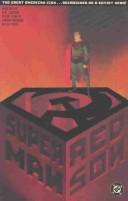Literally Graphic reviewed Superman by Mark Millar
Review of 'Superman' on 'Goodreads'
2 stars
Review from 2018: A sparkling piece of something short of genius. Three stars.
There are some things I do like about this book. The style for one was really refreshing. Mark Millar et al did an excellent job of revisiting the golden age of superman without the dated dialog and artwork. This modern golden age Superman makes for an interesting contrast to all the dark and gritty superheros. Because variety is awesome!
The one huge issue I had with Red Son is that while they brought the dialog and art into the 21st it left the character development back in the 1950's. All the characters are little more then cardboard cutouts! This is especially annoying when it comes to the female characters, who are all defined by their relationships with Superman and Lex Luther. I think this is mostly due to the all consuming nature of the premise and the shortness of the story.
The premise was kind of a love hate thing for me. One the one hand, it was intriguing; on the other hand, it was never really delivered on, because ultimately nothing changes because democracy still wins. I also thought that the Batman character was really unnecessary and barely made sense. Finally, while I didn't hate the ending nearly as much as some people I know, it was certainly not as genius as Grant Morrison seems to think.
Review From 2020:
An Elseworlds tale published by DC comics in 2004, Superman: Red Sons is a speculative take, trying to answer the question, what if Superman's spaceship landed in the Soviet Union instead of Kansas? "The Great American Icon... Re imagined as a Soviet Hero!"
Written by Mark Miller, penciled by Kilian Plunkett and Dave Johnson, inked by Andrew Robinson and Walden Wong, colours by John Higgins, and Ken Lopez on lettering.
As I mentioned I have already read this book before. The first time was back in the early 2010's before I felt too familiar with the characters in play. But the last time, way back in 2018, I felt pretty torn. I rated it three out of five stars, but with a lot of caveats. One of the things that came up over and over again for me was the lack of character development, but I've actually become more comfortable with that this third time through. A character over action kind of reader, this may be a surprising thing to say, but while it's not always true, I can see a reason why focusing on the speculative setting puts character development on the back burner. That said, the more I know of the character, the very less believable the cardboard cutout of Batman is.
Does Batman usually care about personal liberties? Not really. Does Batman generally hate Superman? Even less believable. How does Batman function without being a billionaire playboy? It's not like he has any actual super powers besides being very wealthy and generally pretty confident. It would certainly make more sense for him to be working with Lex Luther.
Otherwise, the next biggest issue came to the portrayal of the apparently female characters and the rather rabid heterosexual agenda that's at play in this book. Why, for example, is Wonder Woman with Superman? This is nonsense. It's only rarely if ever employed, certainly not stock for the character, and generally gives me the impression someone really has no idea what they are talking about. The last being my own personal bias, but hey, that's why people generally listen to me, for my opinion that is. That said, Mark Miller does appear to construct some internal logic to why the two get together in this story, maybe. The reasoning behind the marriage between Lex Luther and Lois Lane, while perhaps more generally a thing, seems completely illogical in this context. It's really only a set up as part of the everything is backwards scheme but nothing in the story itself actually points towards why they stay together.
Unlike many other aspects of this book, I did generally enjoy the art. It was different, it felt like it reflected the general premise of the book. While I'm not against all things sexual, this book is decidedly un-sexy, and that did at least mean that I didn't feel like the sidelined assumed female bodies were not also exploited for attracting what is generally referred to as the "male gaze" to their orifices.
And moving on to a question I recently added to my reviews and still don't always refer to let us look at "who are the good guys and who are the bad guys"? Because this is another way in which Mark Miller stretches out the caricature of the people he is portraying and this time it's Superman and Lex Luther. But first, let me say for the record that I am not the biggest fan of the Soviet Union, but when people write superhero comics about what if the Soviet Union... They are not talking about JUST the Soviet Union. Especially as the story continues and it becomes the world vs the United States, this is not just about the Soviet Union. And the portrayal of Superman as a leader of this anti-America also makes no sense. In any other continuity do people stop wearing seatbelts because of Superman? This was the stupidest detail. Well besides the fact that the seat belt wasn't invented until mid-century and the first law mandating people wear seat belts wasn't until 1970 in Australia. So there was a lot of time with Superman that people didn't wear seat belts. Who actually thinks its even possible for Superman to physically stop every bad thing that happens, even if he was part of some imaginary nanny state that would never actually happen.
Also, as someone who doesn't believe in genius, I would like to call complete and utter bullshit on this iteration of Lex Luther. It also doesn't make sense for capitalism to support the creation of any of the things attributed to Lex Luther's defeating Superman. At least in his case, unlike in Batman's, Miller didn't try and pretend Luther was not being fuelled by a whole lot of wealth. Because wealth, particularly generational wealth, is the only thing that does make some people appear to be so-called geniuses.
Class, much like gender, is totally flattened to portray only the important and powerful white and assumed CIS gender and demonstrably heterosexual men. Race is ignored and excluded.
While some characters are demonstrated to have weaknesses that Lex Luther and other bad guys can exploit, we go beyond natural ableism and Miller unsurprisingly centers only the super able bodied.
And after all that, no matter how highly my goodreads friends have rated this book, and how I originally felt pretty torn about the whole thing, I just can't this time around. Not a fan of kick ass either, I did find Miller's American Jesus slightly more interesting - review coming by the end of the year I think. But yeah, early 2000s Mark Miller and company gets two star. Both of which go to the art team

